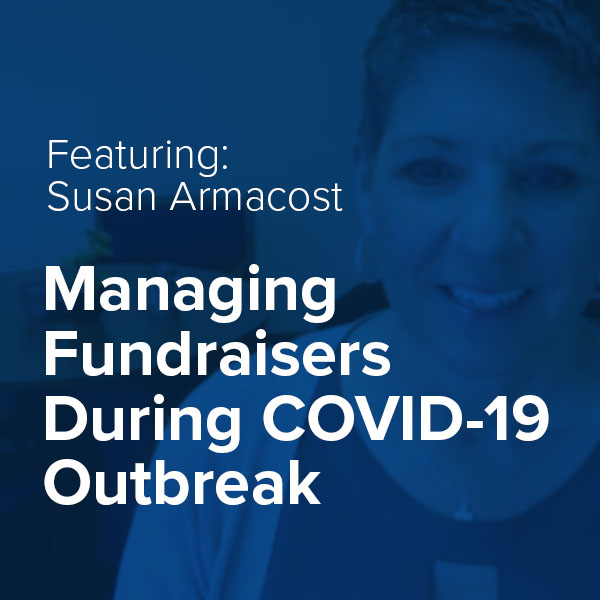Here’s EverTrue’s take on the novel coronavirus pandemic and its impact on advancement: We don’t have all the answers, but we’re going to learn from each other and share best practices for remote fundraising, working from home, managing fundraisers remotely, and handling uncertainty. Bookmark this page and subscribe for ongoing updates.
Like all advancement shops, the development team at the University of Memphis is making moves to keep students, staff, alumni, and donors safe and healthy during the spread of COVID-19. We asked our friend Susan Armacost, Executive Director of University Development, about how she’s supporting her team and her advice for managing fundraisers.
"This is pushing us to use technology — technology that our industry probably already should have adopted."
More activity, fewer asks
“Activity should be heightened, but with lowered expectations for proposals and closed gifts,” Susan said. “It’s a little inappropriate, right now, to ask people to make contributions to things that aren’t top of mind. We don’t want to be seen as taking advantage of a situation or capitalizing on that.”
Now is the time to stay in touch with every assigned prospect — not to make an ask, but to reach out with support and to listen during these challenging times. What are they thinking about? What do they need to know from campus? Make relationship-building the priority and be present for donors.
Meaningful activity — with an eye on the future
Take this opportunity to focus on assigned prospects who haven’t heard from your institution in a while. Industry-wide, nearly two of every three assigned prospects haven’t received a visit in the last year. Susan’s asking her fundraisers to make sure they’re talking to everyone — especially those who haven’t heard from Memphis in a while.
If done right, meaningful interactions now can build major gift pipeline. Talk to donors about what’s important to them, take the time to listen, and those conversations will pay off in the future.
Memphis is going to count all “meaningful interactions” in the next few weeks toward its fundraiser visit goals — whether those conversations happen on video, via email, or over the phone — so Susan is asking her development officers to do personal, customized outreach to all of their assigned prospects.
Keep team meetings structured, on the calendar, and on video
Susan’s keeping weekly team meetings on the schedule as the team shifts to digital gatherings. She’s shortened them slightly but set up a more structured agenda to keep everyone on track and make sure she covers all important items.
And she’s emphasizing video as must-have media. Memphis, like EverTrue, uses Zoom for meetings, which lets her see that everyone’s focused and helps the team connect with each other.
Explore video for prospect meetings
“This is pushing us to use technology — technology that our industry probably already should have adopted,” said Susan.
She’s exploring platforms for gift officers to send one-on-one outreach to their donors — tools like Thankview, Vidyard, or Soapbox.
(Looking for more information? We broke down some of the best technology for remote fundraising.)
Above all, be patient and flexible
“Be patient, be flexible,” Susan said as her parting words. “This is the time to trust your team. I’ve encouraged mine to work remotely. There’s not anything we do that requires our frontline team to be in the office… It’s important for managers to be engaged with their direct reports in intentional ways so that they all feel like they’re part of the team.”

[…] Well, we have that too. We’ve interviewed Eric Holderness of K-State, Heather Kopec of Virginia Tech, Ashley Budd of Cornell University, Angela Wimmer of University of Arkansas for Medical Sciences, and Susan Armacost of the University of Memphis. […]